The Ourika Valley is a picturesque region located in the High Atlas Mountains of Morocco, near Marrakech. It’s known for its stunning natural beauty, including lush greenery, cascading waterfalls, and traditional Berber villages. Many visitors are drawn to the valley for day trips or hikes to explore the scenic landscapes, visit local markets, and experience Unforgettable the Berber culture firsthand. The valley offers a refreshing escape from the bustling city life of Marrakech and provides opportunities for activities like trekking
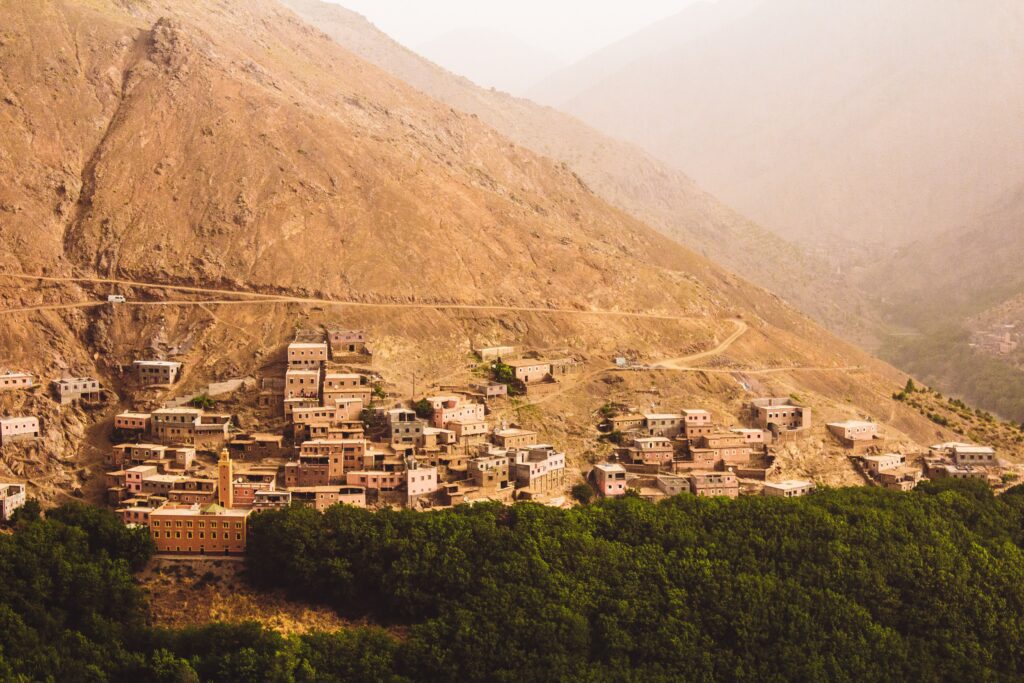
1-Visit Setti Fatma
the quaint village of Setti Fatma beckons adventurers with promises of natural wonder and cultural immersion. Serving as a portal to enchantment, this charming settlement is more than a mere stopover; it’s the threshold to an exhilarating journey.
Setting foot in Setti Fatma, travelers find themselves at the precipice of an adventure that winds through rugged terrains and ancient trails. Here, amidst the majestic High Atlas Mountains, the Seven Waterfalls hike reigns supreme—a pilgrimage coveted by explorers seeking the marvels of nature.
As hikers embark on this revered trek, each step unravels a tapestry of breathtaking vistas and cascading wonders. The trail meanders through verdant landscapes, where the crystalline waters of the Ourika River mirror the azure skies above. Along the way, the melody of rushing waters serenades the senses, guiding intrepid souls deeper into this sanctuary of beauty.
But it’s not merely the promise of seven ethereal waterfalls that enchants visitors; it’s the harmonious amalgamation of nature’s grandeur and the village’s rustic allure. Setti Fatma’s authenticity, preserved in its traditional Berber architecture and warm hospitality, offers a glimpse into a lifestyle rooted in centuries of heritage.
At journey’s end, as hikers stand before the cascade’s crescendo, they are rewarded not just with the sight of majestic falls plunging into emerald pools but with a sense of accomplishment—a communion with nature’s magnificence that transcends words.
Setti Fatma, with its gateway to the Seven Waterfalls, serves not just as a destination but as a testament to the inexhaustible marvels nature bequeaths upon those willing to seek and embrace its treasures. It’s a haven where the symphony of rushing waters and the whispers of the mountains weave a tale that lingers in the hearts of all who venture there.
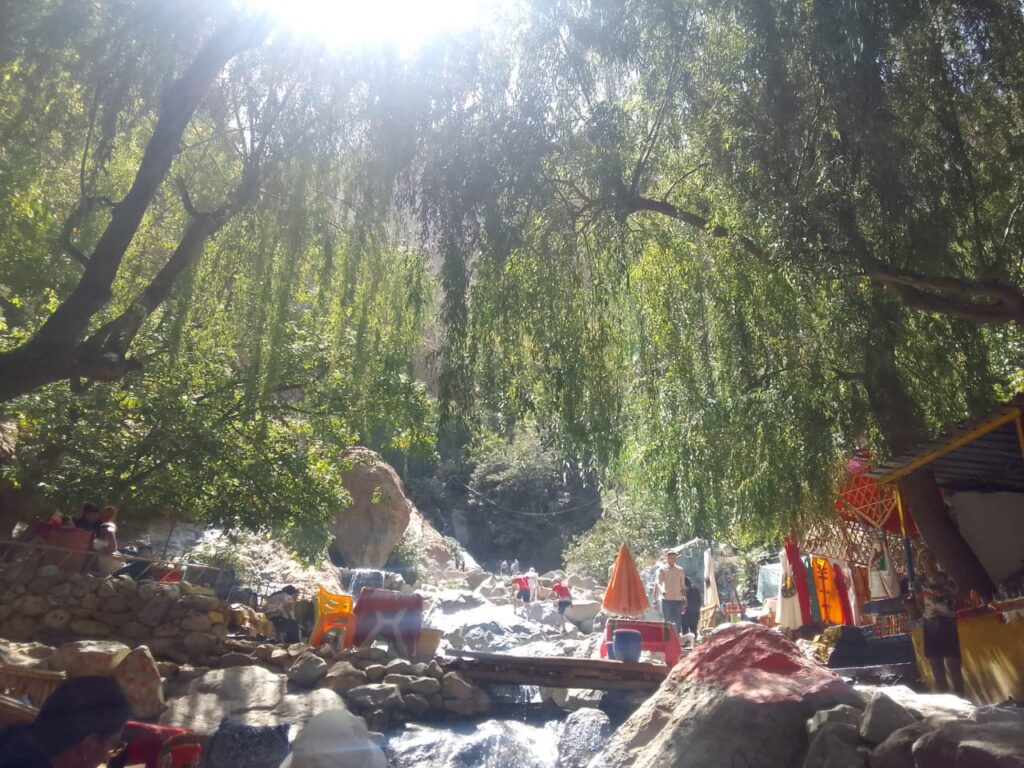
2- Explore Berber Villages
Nestled within the rugged and captivating landscapes of North Africa, Berber villages offer a unique glimpse into a world rich with tradition, culture, and breathtaking vistas. Spread across the Atlas Mountains, these villages have stood the test of time, preserving age-old customs while embracing the modern world.
Traversing the Berber villages means embarking on a journey through history. These settlements, often perched on hillsides or nestled within valleys, are a testament to resilience and adaptability. The distinctive architecture, characterized by clay-brick homes and narrow alleys, seamlessly blends with the natural surroundings, creating an enchanting harmony between human craftsmanship and nature’s beauty.
One of the most remarkable aspects of visiting Berber villages is the opportunity to engage with the locals. Hospitality is ingrained in their culture, and visitors are often welcomed with warmth and open arms. Conversations flow freely over steaming cups of mint tea, providing insights into their traditional way of life, folklore, and the challenges they face in a rapidly changing world.
Exploring these villages isn’t merely about admiring the stunning vistas or architectural marvels; it’s about immersing oneself in a tapestry of traditions. Visitors can witness traditional Berber crafts firsthand, from vibrant textile weaving to intricate pottery making. Markets bustle with activity, offering a cornucopia of spices, handmade goods, and local produce, providing a sensory feast for visitors.
The natural surroundings of Berber villages are equally captivating. Towering mountains, verdant valleys, and terraced fields paint a picturesque backdrop that beckons adventurers. Hiking trails crisscross through the Atlas Mountains, revealing hidden waterfalls, ancient ruins, and panoramic views that leave a lasting impression.
As the world continues to evolve, these villages stand as guardians of a way of life deeply rooted in respect for nature and community. Visiting Berber villages isn’t just a sightseeing expedition; it’s a chance to embrace a cultural legacy, forging connections that transcend borders and time.
In essence, exploring Berber villages isn’t merely a visit; it’s an immersive experience that leaves an indelible mark on one’s soul—a tapestry woven with hospitality, history, and the enduring spirit of a vibrant culture amidst breathtaking landscapes.
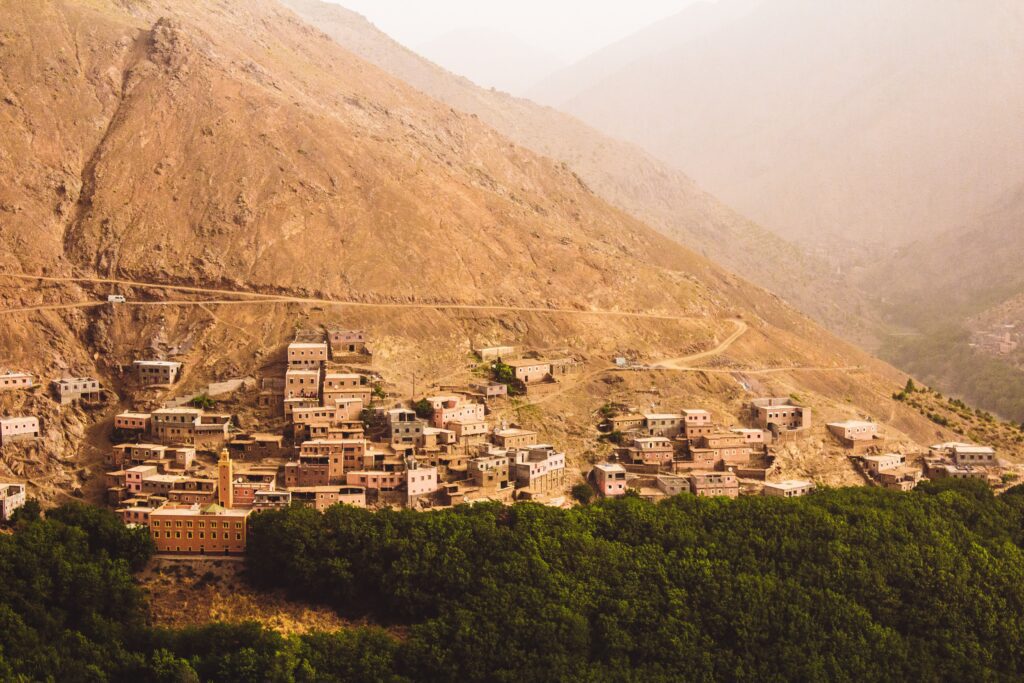
3- OURIKA waterfall
The Ourika Valley, an oasis of natural beauty nestled in the foothills of the Atlas Mountains in Morocco, boasts one of its most captivating treasures: the Ourika Waterfalls. Carving its way through the rugged terrain, the Ourika River cascades down several tiers, creating a mesmerizing spectacle that attracts travelers from around the world.
The journey to the waterfalls is an adventure in itself. Travelers traverse through the valley, passing Berber villages adorned with terraced fields and surrounded by vibrant greenery. The journey is a delightful immersion into local culture, where the hospitality of the Berber people and their traditional way of life captivate visitors.
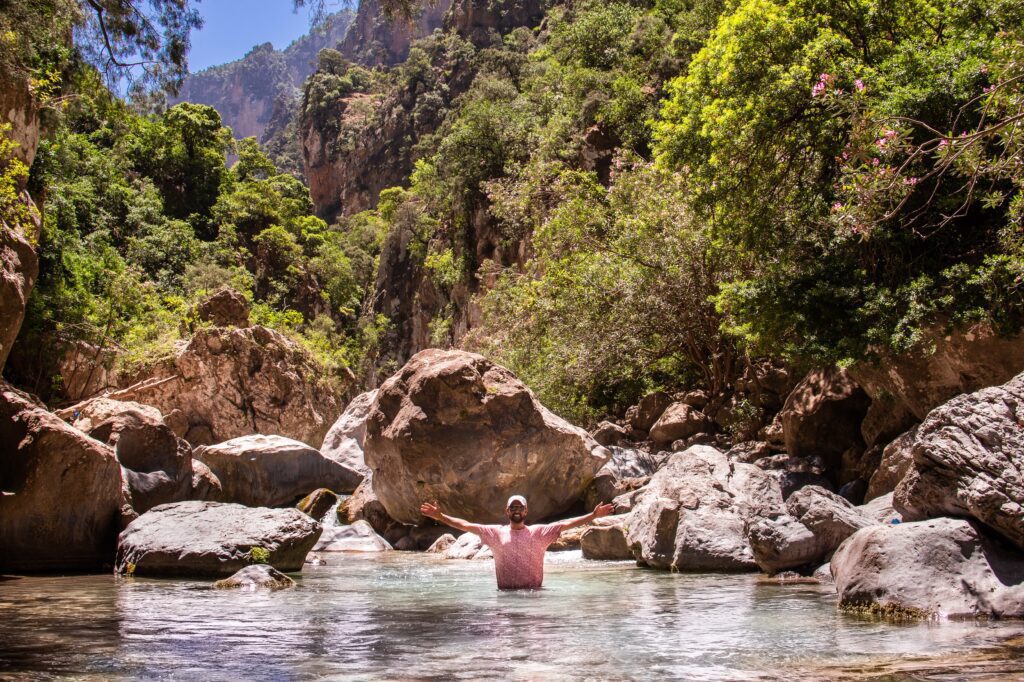
4- Cooperative Argan
The Cooperative Argan stands as a beacon of sustainable enterprise, rooted in the heart of the Ourika region. With a dedication to preserving the environment and empowering local communities, this cooperative embodies the essence of cooperative spirit. By harnessing the rich resources of the argan tree, they produce exquisite oils and products while ensuring fair wages and opportunities for the skilled hands that nurture this natural treasure. Through their commitment to ethical practices and communal prosperity, Cooperative Argan not only cultivates the coveted argan oil but also cultivates a brighter future for the region’s inhabitants.
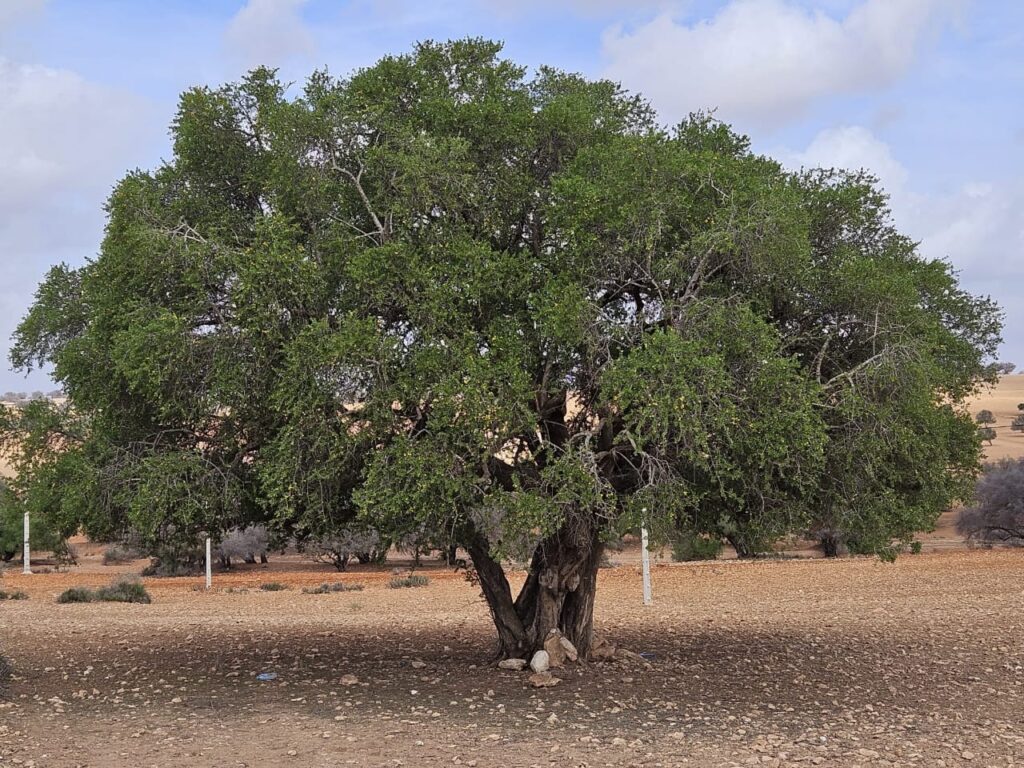
5- Experience berber Cuisine
Experiencing Berber cuisine is a tantalizing journey into the heart of North African flavors and traditions. Rooted in centuries-old culinary practices, Berber cuisine reflects the region’s diverse landscapes and cultural influences. The use of aromatic spices like cumin, paprika, and saffron infuses dishes with rich, earthy flavors that dance on the palate. Tagines, slow-cooked stews, are a hallmark, combining tender meats or vegetables with dried fruits and savory spices, creating a harmonious blend of sweet and savory. Couscous, a staple, takes center stage, adorned with colorful arrays of vegetables, meats, or legumes, providing a delightful mosaic of tastes and textures.
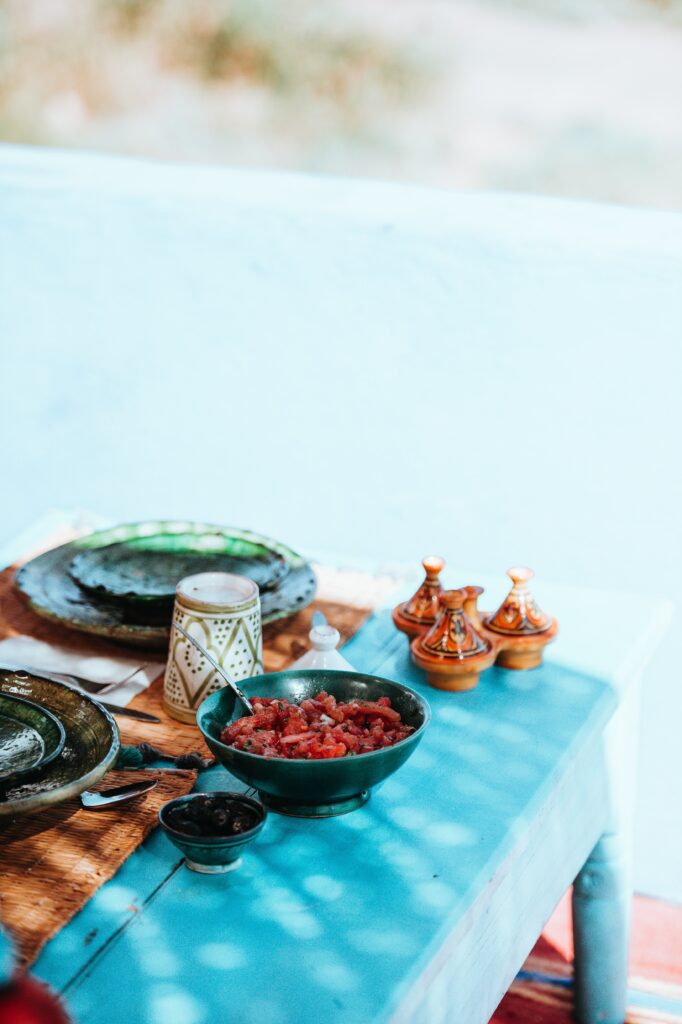
6-Discover the Ourika Market
The markets in the Ourika Valley offer a vibrant tapestry of sights, sounds, and scents, showcasing the essence of local life. Every week, these markets burst to life with a colorful array of stalls, each offering a treasure trove of goods. Amidst the stunning backdrop of the Atlas Mountains, vendors lay out their wares, displaying fresh produce, aromatic spices, handcrafted goods, and traditional Berber textiles.
Locals and tourists alike wander through the bustling aisles, engaging in lively banter and haggling over prices. The air is filled with the aroma of freshly baked bread, the earthy scent of spices, and the sweet fragrance of local herbs. Visitors have the opportunity to immerse themselves in the culture, sampling exotic fruits, sipping on freshly squeezed juices, and admiring the intricate designs of handmade rugs and pottery.
These markets are not just places of commerce; they are communal hubs where generations converge, sharing stories, traditions, and the warmth of Berber hospitality. The markets of the














